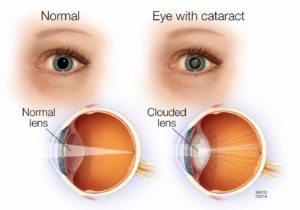 June is Cataract Awareness Month, and Great Care wants to help educate seniors and caregivers about diagnosis, treatment and recovery to prevent blindness.
June is Cataract Awareness Month, and Great Care wants to help educate seniors and caregivers about diagnosis, treatment and recovery to prevent blindness.
According to Prevent Blindness and a Prevent Blindness Vision Problems report, more than 22.3 million Americans have cataracts,. The condition is the leading cause of blindness among older adults in the U.S. Prevent Blindness defines cataracts as a clouding of the eye’s lens, located behind the pupil and the colored iris, which is normally transparent and blocks or changes the passage of light into the eye.
“The lens helps to focus images onto the retina, which transmits the images to the brain,” Prevent Blindness says. “Your vision may become blurry or dim because the cataract stops light from properly passing through to your retina.”
More than half of all Americans have cataracts by the time they’re 80 years old, reports Prevent Blindness, although they can also sometimes be found in young people or even newborn babies.
“Cataracts are probably caused by changes related to aging. Throughout our lives, our bodies replace old cells with new ones. As we grow older, the old cells in our eye’s lens build up and block light as it tries to pass through. The end result is cloudy vision,” Prevent Blindness says. “Besides getting older, other factors may cause cataracts to form. Eye infections, some medicines (such as steroids), injuries or exposure to intense heat or radiation may cause cataracts. Too much exposure to non-visible sunlight (called UV or ultraviolet light) and various diseases, such as diabetes or metabolic disorders, may also contribute to cataracts forming.”
Prevent Blindness notes that everyone experiences cataracts differently, but cataracts commonly cause cloudy or blurry vision.
“Lights may cause a glare, seem too dim or seem too bright. It may be hard to read or drive, especially at night. If you have a cataract, you may see halos around lights, such as car headlights, that make it hard to focus clearly. Colors may not seem as bright as they used to be,” the nonprofit organization says. “Or you may have to change your eyeglass prescription often. If you notice any of these changes, make an appointment to see your eye doctor. If you have a cataract, you may have symptoms that are similar to those of other eye diseases. Only your eye doctor can tell you for sure what’s wrong.”
The American Academy of Ophthalmology reminds the public that early detection and treatment of cataracts is critical to preserving sight during Cataract Awareness Month. In June, the Academy observes the month by sharing important info about cataracts and treatment:
“As everyone grows older, the lenses of their eyes thicken and become cloudier. Eventually, they may find it more difficult to read street signs. Colors may seem dull. These symptoms may signal cataracts, which affect about 70 percent of people by age 75,” the AAOO says. “Fortunately, cataracts can be corrected with surgery. Ophthalmologists, physicians who specialize in medical and surgical eye care, perform around three million cataract surgeries each year to restore vision to those patients.”
The AAOO provides facts people should know about the condition:
1. Age isn’t the only risk factor for cataracts. Though most everyone will develop cataracts with age, recent studies show that lifestyle and behavior can influence when and how severely you develop cataracts. Diabetes, extensive exposure to sunlight, smoking, obesity, high blood pressure and certain ethnicities have all been linked to increased risk of cataracts. Eye injuries, prior eye surgery and long-term use of steroid medication can also result in cataracts. If you have any of these or other risk factors, talk to an ophthalmologist.
2. Cataracts cannot be prevented, but you can lower your risk. Wearing UV-blocking sunglasses and brimmed hats when outside can help. Several studies suggest that eating more vitamin C-rich foods may delay how fast cataracts form. Also, avoid smoking cigarettes, which have been shown to increase the risk of cataract development.
3. Surgery may help improve more than just your vision. During the procedure, the natural clouded lens is replaced with an artificial lens called an intraocular lens, or IOL, which should improve your vision significantly. Patients have a variety of lenses to choose from, each with different benefits. Studies have shown that cataract surgery can improve quality of life and reduce the risk of falling. If cataracts are interfering with your ability to see well, consider asking your ophthalmologist about cataract surgery.
For more information about cataracts, visit http://www.aao.org and http://www.preventblindness.org/cataract.
The professionals at Great Care are available to talk with you and your family about all of your home care needs, including respite care. Great Care is a non medical in-home care agency providing quality and affordable elder care in Fishers, IN and the surrounding areas. Call (888) 240-9101 for more information.
Follow Us!